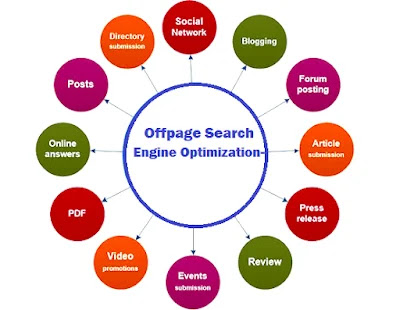5 – Offpage Search Engine Optimization
We've already optimized our blog to rank well in search results for some of the keywords we're targeting, but here's the sad news: it only affects your rankings in a very small way. However, don't skip this step because every detail counts when you're competing for search engine rankings.
We now turn to off-page search engine optimization. That is, factors that are not on your blog but significantly affect your search engine rankings. There are many off-page factors, but we'll go through them one by one. The first and most obvious is the number of links to your blog.
Let's talk about how we should ask these authority webmasters to link to your blog. We discuss this with the assumption that your blog is truly content-rich and offers high-quality information to anyone in your niche or topic of discussion. The most viable option would be to send an email directly to the webmaster.
conclusion:
Off-page SEO refers to optimization techniques that
occur outside of the website being optimized. These techniques include building
backlinks, creating brand mentions and citations, and building relationships
with influencers in the industry. Backlinks are particularly important for
off-page SEO, as they signal to search engines that other websites consider the
content on your site to be valuable and relevant. Brand mentions and citations
help to increase the visibility of a website by making it more likely to appear
in search results when someone searches for the brand name. Building
relationships with influencers in the industry can also help to increase
visibility, as these influencers may share or link to your content.
Blogging is one way to improve off-page SEO, as it is a
great way to create valuable content that other websites may want to link to.
Blogging can also help to increase brand mentions and citations, as people who
read your blog are more likely to talk about and link to your brand.
It is important to note that off-page SEO is not a one-time
activity but rather a continuous process. It required regular monitoring,
updating and maintaining of the backlinks, brand mentions, influencer
relationship etc.
how we should ask these webmasters of authority to link to
your blog??
There are several ways to ask webmasters of authority to
link to your blog:
- Personalized
email: Reach out to them personally by sending an email introducing
yourself, explaining why you think their website would benefit from linking
to your blog, and providing examples of how your content is relevant to
their audience.
- Blog
commenting: Leave comments on their blog posts that add value to the
discussion and include a link to your own blog in the comment.
- Social
media: Use social media to connect with webmasters of authority. Engage
with their content, share it with your own followers, and mention them in
your posts.
- Outreach
Tools: Use Outreach tools to automate the process, such as MailShake,
Hunter, BuzzStream, etc
- Guest
Blogging: Offer to write a guest post for their website and include a link
to your blog in the author bio.
It's important to remember that building relationships with
webmasters of authority takes time, and you should focus on creating valuable
content that will attract links naturally. Also, Try to avoid using template
messages, it is important to personalize the message and target the webmaster
as per the niche of their website.
You should also be prepared to offer something in return for
the link. This could be a link back to their site from your blog or a social
media shoutout.
It's also important to be respectful of their time and decision-making process and not to follow-up too frequently or aggressively.

